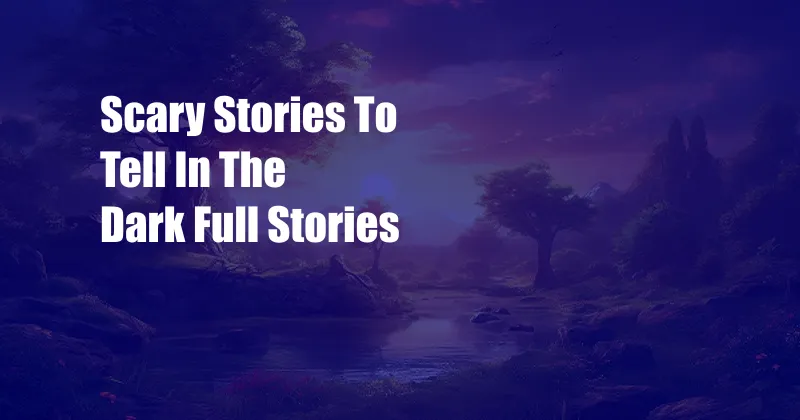
Scary Stories to Tell in the Dark: Spine-Tingling Tales for the Night
As a child, I was enthralled by the bone-chilling tales of “Scary Stories to Tell in the Dark.” These stories, passed down from generation to generation, have the power to make our hearts pound with fear and send shivers down our spines. In this article, we’ll venture into the realm of these spine-tingling tales, exploring their history, impact, and the enduring appeal they hold.
Delving deeper into the annals of horror literature, we find that the roots of these stories can be traced back to the ancient tradition of oral storytelling, where tales of the supernatural and the macabre were shared around campfires and in darkened rooms. In the 20th century, these stories were compiled and published in the iconic “Scary Stories to Tell in the Dark” series by Alvin Schwartz, bringing them to a wider audience and solidifying their place in popular culture.
The Allure of Darkness: Exploring the Appeal of Fear
The allure of scary stories lies in their ability to evoke a primal response within us. Fear, as an emotion, is deeply ingrained in our evolutionary makeup, serving as a protective mechanism against potential threats. When we engage with stories that elicit fear, we experience a controlled and safe exposure to this emotion, allowing us to explore and conquer our fears without real danger.
Beyond the thrill of the scare, scary stories also provide a cathartic experience. By confronting our fears through the medium of storytelling, we can process them, making them less overwhelming in real life. Additionally, these stories can foster a sense of community, bringing people together through shared experiences of fear and the desire to find solace in the face of the unknown.
A Journey Through Time: The Evolution of Scary Stories
Throughout history, scary stories have undergone various transformations, reflecting the cultural and societal influences of their time. In the early days of the printed word, chapbooks and broadside ballads featured macabre and supernatural elements, capturing the fascination with the unknown and the belief in the unseen.
The Victorian era witnessed a surge in Gothic literature, with its tales of suspense, haunted houses, and supernatural encounters. This genre laid the foundation for the modern horror story, characterized by its exploration of the dark recesses of the human psyche and the horrors that can lurk within.
Horror in the Digital Age: Modern Interpretations and Trends
In the contemporary digital age, scary stories continue to thrive, finding new platforms and mediums for expression. Podcasts like “The NoSleep Podcast” and “Lore” offer immersive and chilling narratives that tap into the primal fear of the unknown.
On social media, platforms such as Reddit’s “NoSleep” subreddit and TikTok’s #horror community provide a vast and ever-growing library of user-generated scary stories, showcasing the boundless creativity of modern storytellers. Interactive horror experiences like “The Conjuring House” and “The Haunted Hotel” blend technology and narrative, creating immersive and spine-tingling experiences.
Tips for Crafting Compelling Scary Stories
If you aspire to craft your own spine-chilling tales, consider these expert tips:
- Ground the Story in Reality: While horror often involves supernatural elements, grounding your story in familiar, everyday settings can enhance the sense of fear by making the events feel more relatable and plausible.
- Create Vivid Imagery: Use sensory details to paint a vivid picture in the reader’s mind. Engage their senses of sight, sound, touch, smell, and taste to immerse them in the atmosphere of your story.
- Build Suspense Gradually: Don’t rush the scares. Slowly build tension and anticipation, leading the reader to the climax in a way that keeps them on the edge of their seat.
- Explore Universal Fears: Tap into primal fears that resonate with a wide audience, such as the fear of the dark, the fear of being alone, or the fear of the unknown.
- Avoid Clichés: While certain elements are common to scary stories, strive to find original and unexpected ways to present them. Avoid overused tropes and clichés that can diminish the impact of your story.
Frequently Asked Questions
- What are the origins of “Scary Stories to Tell in the Dark”?
- The stories in the “Scary Stories to Tell in the Dark” series were compiled by Alvin Schwartz from various sources, including oral folklore, urban legends, and traditional literature.
- Why are scary stories so popular?
- Scary stories provide a safe and controlled exposure to fear, allowing us to experience and process this emotion without real danger. They also foster a sense of community and offer cathartic experiences.
- What are some modern trends in horror storytelling?
- Modern horror storytelling embraces new platforms like podcasts and social media, offering immersive and interactive experiences. It also explores contemporary fears and societal anxieties.
- How can I craft compelling scary stories?
- Ground your story in reality, create vivid imagery, build suspense gradually, explore universal fears, and avoid clichés.
Conclusion
The world of “Scary Stories to Tell in the Dark” is a realm of spine-tingling tales that have captivated generations. Exploring our fascination with fear, we’ve delved into the history and evolution of these stories, witnessing their enduring appeal. Whether you’re a seasoned horror enthusiast or new to the genre, I invite you to embrace the thrill of the unknown, to experience the catharsis of fear, and to explore the boundless creativity of modern horror storytelling.
Are you ready to venture into the depths of the unknown? Let the whispers of “Scary Stories to Tell in the Dark” ignite your imagination and lead you on a thrilling journey through the shadows.